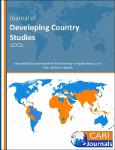Household Size and Household Food Security in Ngetta Ward, Lira City, Northern Uganda
Abstract
Purpose: The study examined the effect of Household size/family size on Household food security in Lira city East Division. Specific issues that were studied are; the impact of average household size on household food security, the level of household food security and the effect of household size on household food security ‟household food security and whether household size affects household food security.
Methodology: A purposive sampling and simple random sampling method for the study was used to select houses in each cell for the distribution of the questionnaire. Questionnaires and interview guide served as the main tools for data collection. The study targeted a sample population of 300 respondents out of which 60 participants were drawn from the small family and the other 240 from the large family in the study area.
Findings: The findings indicated that, large family size puts an extra burden on food consumption and is more likely to experience food insecurity in contrast to households with a small and average family size. Large households, with more young or school-going children, also tend to fall below the poverty line and vulnerable to food insecurity. The results further revealed financial problems, lack of parental care and poor heath as the challenges faced by large families.
Unique contribution to theory, practice and policy: This study contributes to the understanding of the relationship between household size and household food security so that policy makers can plan for an ever growing human population especially in the rural and peri-urban areas. The study recommends the need for intensive education on population related matters for parents and various incentives packages to families with smaller sizes.
Collections
- Research Articles [143]

